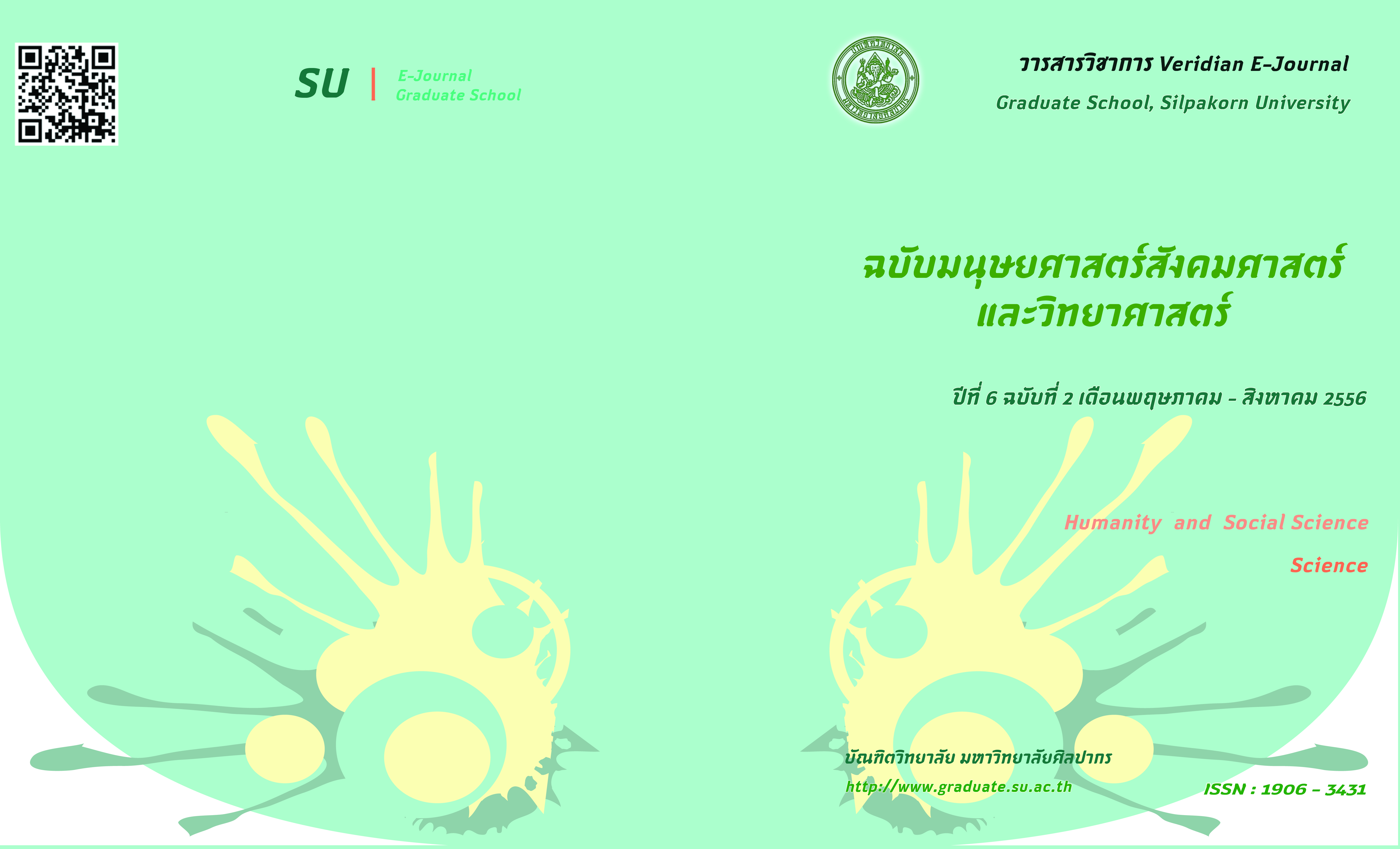ปัจจัยที่ส่งผลต่อการคิดเชิงวิทยาศาสตร์ของนักเรียนชั้นประถมศึกษาปีที่ 6 ในโรงเรียน สังกัดสำนักการศึกษา กรุงเทพมหานคร โดยใช้การวิเคราะห์พหุระดับ
Main Article Content
Abstract
บทคัดย่อ
การวิจัยครั้งนี้มีจุดมุ่งหมายเพื่อศึกษาตัวแปรระดับนักเรียนและระดับห้องเรียนที่มีอิทธิพลต่อการคิดเชิงวิทยาศาสตร์ของนักเรียน และเพื่อศึกษาความแปรปรวนร่วมของตัวแปรต่างระดับที่มีอิทธิพลต่อการคิดเชิงวิทยาศาสตร์ของนักเรียน โดยตัวแปรระดับนักเรียน ได้แก่ เจตคติต่อวิทยาศาสตร์ ความรู้พื้นฐานเดิมวิชาวิทยาศาสตร์ แรงจูงใจใฝ่สัมฤทธิ์ และการส่งเสริมสนับสนุนด้านวิทยาศาสตร์จากผู้ปกครอง และตัวแปรระดับห้องเรียน ได้แก่ บรรยากาศในห้องเรียนวิทยาศาสตร์ และ คุณภาพการสอนวิทยาศาสตร์ กลุ่มตัวอย่างเป็นนักเรียนชั้นประถมศึกษาปีที่ 6 ปีการศึกษา 2555 โรงเรียนสังกัดสำนักการศึกษา กรุงเทพมหานคร นักเรียน จำนวน 998 คน ห้องเรียน จำนวน 39 ห้องเรียน ซึ่งได้มาโดยการสุ่มแบบหลายขั้นตอน เครื่องมือที่ใช้ในการเก็บรวบรวมข้อมูล ประกอบด้วยแบบทดสอบวัดการคิดเชิงวิทยาศาสตร์ และแบบสอบถามวัดเจตคติต่อวิทยาศาสตร์ แรงจูงใจใฝ่สัมฤทธิ์ การส่งเสริมสนับสนุนด้านวิทยาศาสตร์จากผู้ปกครอง และบรรยากาศในห้องเรียนวิทยาศาสตร์ มีความเชื่อมั่นของเครื่องมือที่ใช้ในการวิจัยเท่ากับ 0.786, 0.876, 0.913, 0.913 และ 0.925 ตามลำดับ วิเคราะห์ข้อมูลด้วยการวิเคราะห์พหุระดับ ด้วยเทคนิคการลดหลั่นเชิงเส้นตรง โดยใช้โปรแกรมสำเร็จรูป HLM 6.03 for windows ซึ่งมีรูปแบบการวิเคราะห์ 2 ระดับ ได้แก่ ระดับนักเรียน และระดับห้องเรียน
ผลการวิจัยพบว่า
ตัวแปรระดับนักเรียน ได้แก่ เจตคติต่อวิทยาศาสตร์ และความรู้พื้นฐานเดิมวิชาวิทยาศาสตร์ ส่งผลทางบวกต่อการคิดเชิงวิทยาศาสตร์ของนักเรียนอย่างมีนัยสำคัญทางสถิติที่ระดับ 0.01 และการส่งเสริมสนับสนุนด้านวิทยาศาสตร์จากผู้ปกครองส่งผลทางลบต่อการคิดเชิงวิทยาศาสตร์ของนักเรียนอย่างมีนัยสำคัญ ทางสถิติที่ระดับ 0.01 ส่วนตัวแปรระดับห้องเรียน ได้แก่ บรรยากาศในห้องเรียนวิทยาศาสตร์ และคุณภาพการสอนวิทยาศาสตร์ไม่ส่งผลต่อการคิดเชิงวิทยาศาสตร์
Abstract
The purposes of this research were 1) to study the variables of student’s education levels and variables of student’s classroom levels influencing on students’ scientific thinking and 2) to study the variation of students’ scientific thinking associated to the education and classroom levels. The independent variables are student’s education levels (i.e., attitude towards science subjects, previous science grade, achievement motive and home educational support), and classroom levels (i.e., science classroom environment and quality of instruction). The samples consisted of 998 students and 39 classes from prathomsuksa VI in the academic year 2012 of schools in the department of education Bangkok metropolitan administration. These samples were selected by using multi-stage random sampling. Students were required to sit for the tests of scientific thinking and to fill questionnaires on attitude towards science subjects , achievement motive, home educational support and science classroom environment. With their reliabilities of 0.786, 0.876, 0.913, 0.913 and 0.925 respectively. Multilevel analysis based Hierarchical Linear Model (HLM) at two levels (student’s education levels and classroom levels) were used to analyze data by using program HLM 6.03 for windows.
The results of the research were as follows:
1. For the student’s education level, the significant variables influencing the students’ scientific thinking at 0.01 levels were attitude towards science subjects, previous science grade and home educational support. For the classroom levels, science classroom environment and quality of instruction were not significant.
2. The variables of student’s education level and variables at classroom level can describe the variation of prathomsuksa VI students’ scientific thinking with 39.83 %
